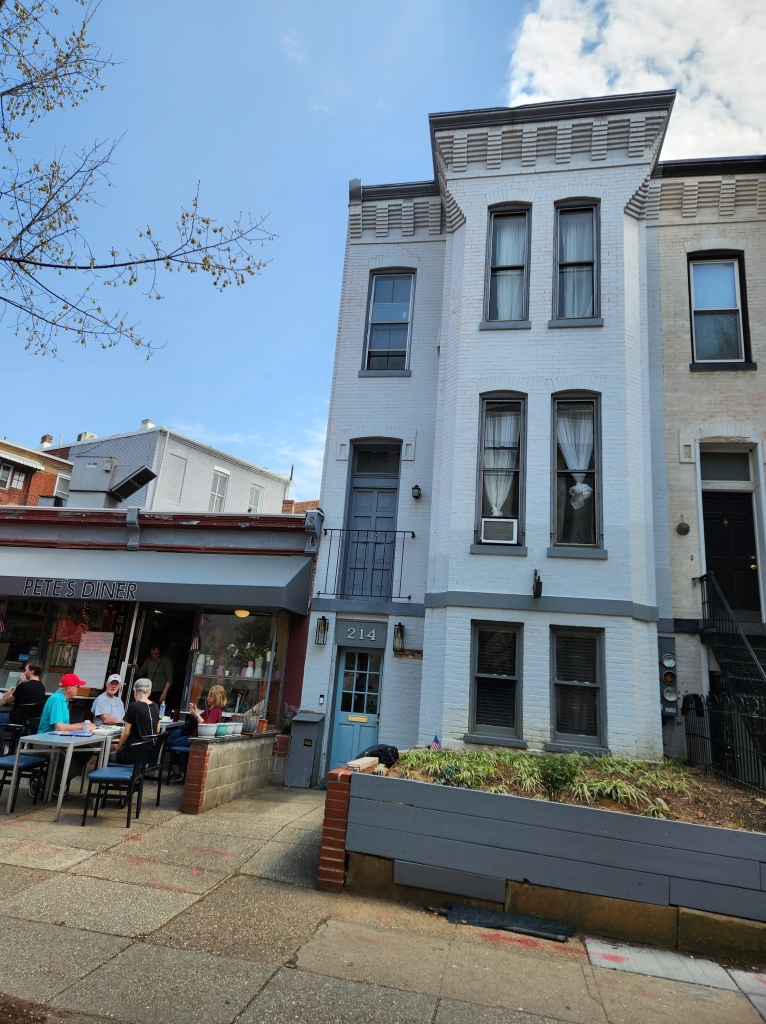
This property at 214 First Street, SE, next to Pete’s Diner, is a residence which is being used as meeting and event space by Prolegis, a nonpartisan information and policy analysis service.
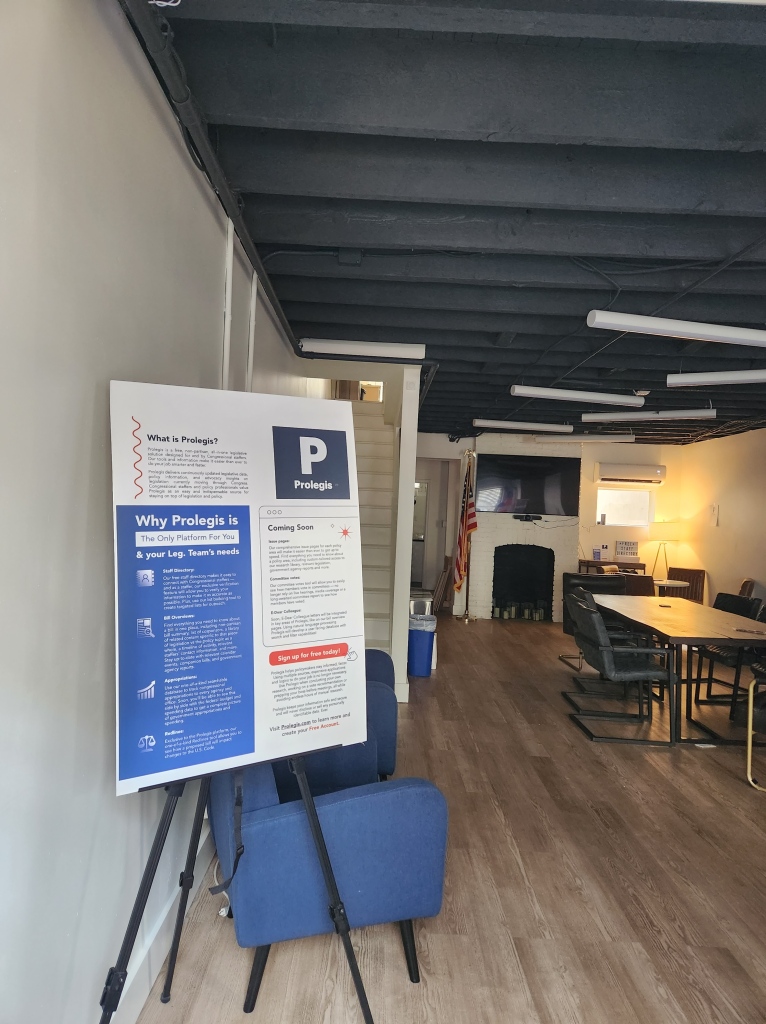
Here’s a shot of their first floor.
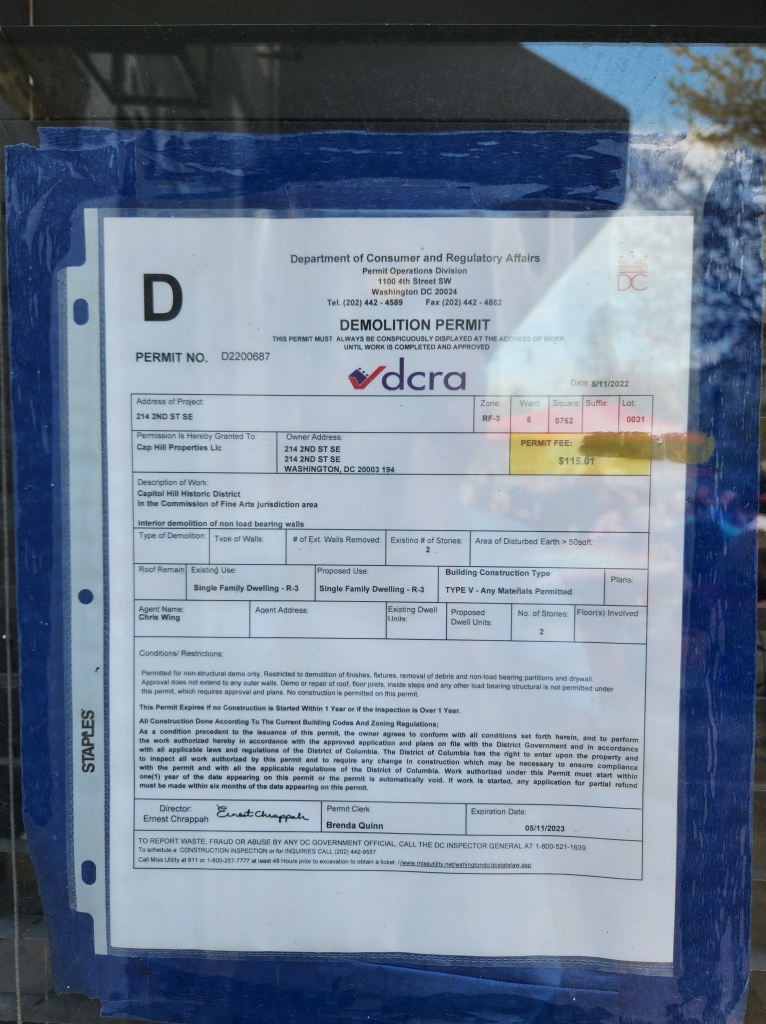
Here’s their building permit stating the intent to continue use as a single family dwelling – R-3 Zoning. A DOB inspector who visited the site to check for illegal construction of a wet bar, stage and sound system in the back yard shortly after this photo was taken, apparently did not question the commercial use of the property.
Illegal Use of Residential Properties for Commercial Purposes Continues to Plague Capitol Hill
by Larry Janezich
Posted July 11, 2023
In late June, ANC6B Commissioner Jerry Sroufe convened a community meeting attended by some 25 community members on illegal use of Capitol Hill residences by commercial entities and non-profits. Sroufe acted on behalf of requests from residents – including a large number living on or near New Jersey Avenue, SE.
Most of the objections neighbors have regarding this illegal use of residences are quality of life issues, including:
- Use of the properties for events, including breakfasts, dinners, parties and fund raisers.
- Parking by those attending events, including double parking.
- Trash issues including routinely putting out trash on Friday night.
- Having a property on the block, vacant much of the time, often deserted at night, with no permanent occupant.
- Cash offers for purchase, pricing homeowners out of desirable school districts.
- Local restaurants being undercut because of events hosted in residential properties.
The issue is not a new one. A 1985 Washington Post article cited the illegal conversion of residential spaces in Georgetown and Dupont Circle as well as Capitol Hill. Back then, complaints came from owners of commercial office space who said they were being undercut by entities who buy residential properties for business purposes because it is so much cheaper than commercial space.
A DC law passed in 1985 allowed the city to prosecute businesses operating out of residences without living in them as civil offenses, theoretically making zoning violations easier to enforce. The city was allowed to issue citations and levy fines. The problem then, as now, is enforcement. The city appears not to have the desire or the capability to enforce the law.
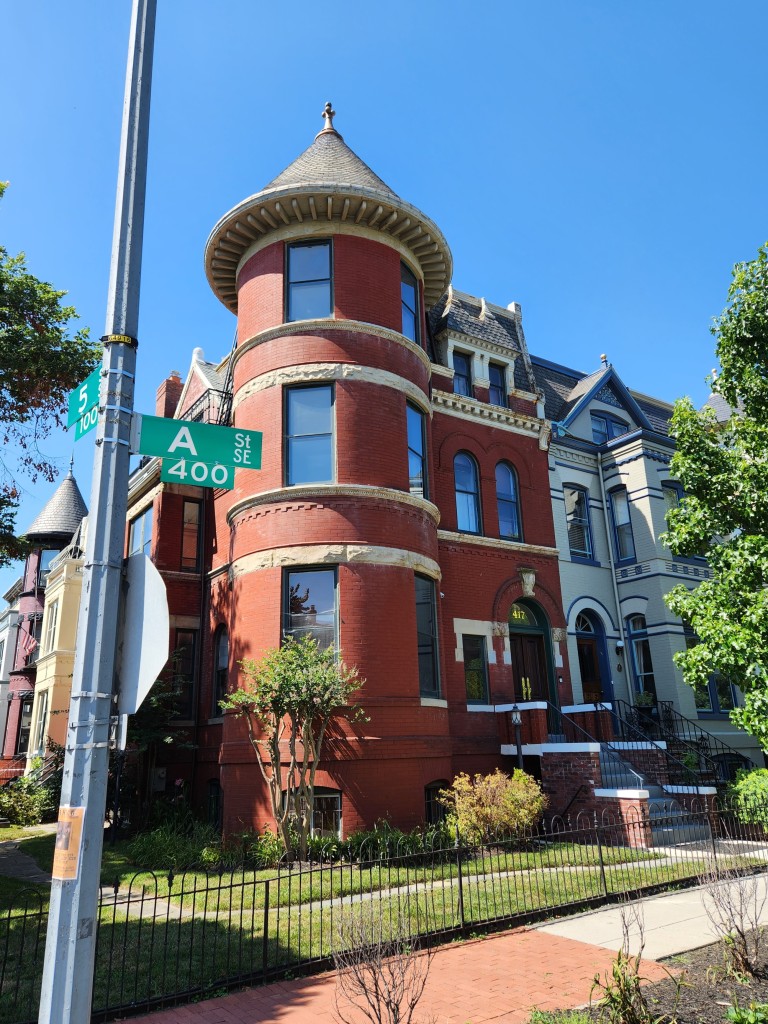
417 A Street, SE.
Jeff Gene, a Capitol Hill resident attending the meeting, distributed a spreadsheet of some of the businesses and organizations which have purchased residential properties on Capitol Hill for commercial purposes. He cited 417 A Street, SE, as being used illegally as business offices by multiple individuals who do not own the property or live in the property. See others on the list below:

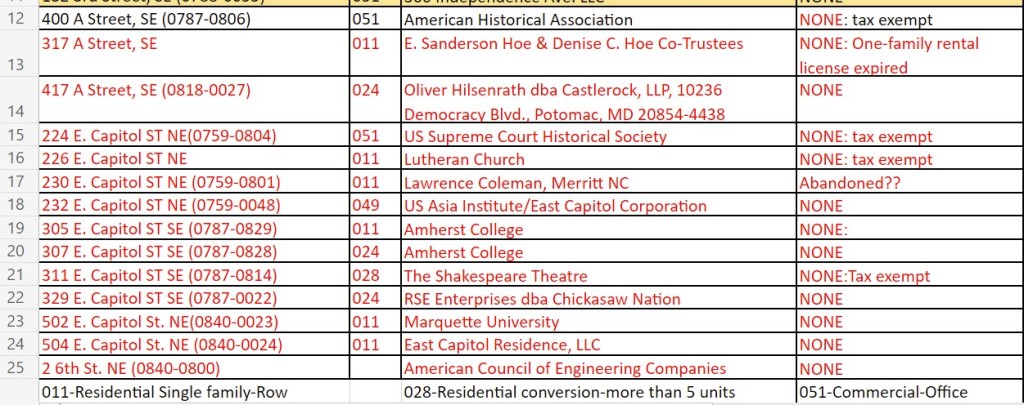
In an email shared with Capitol Hill Corner, Gene says, “The spreadsheet…shows numerous issues with other organizations in the immediate area. Most are zoned single family residences, but are being used for other purposes and most without the requisite business licenses….This is clearly a blatant violation of DC zoning laws and residents’ expectations.”
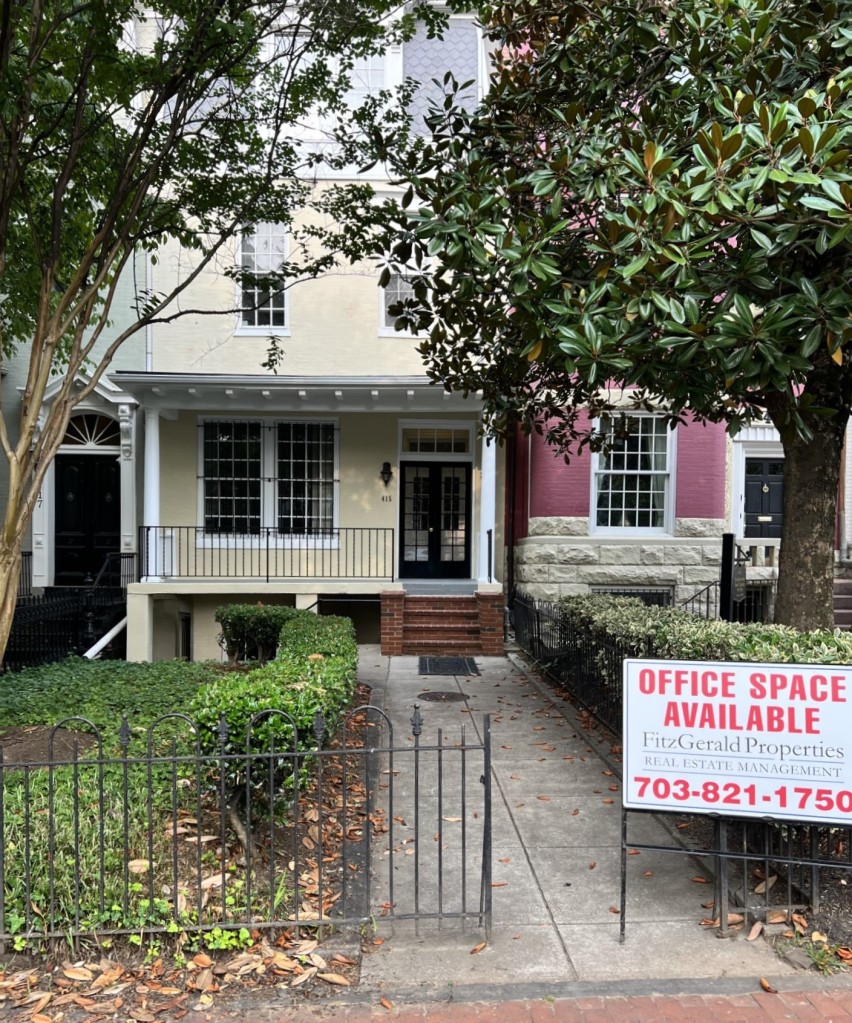
Some of the property owners are not subtle about what they are up to, as at this residence at 415 New Jersey Avenue, SE.
A representative from CM Charles Allen attended the community meeting, but left after residents expressed their unhappiness with what they perceived as Allen’s inattention to the problem of illegal conversion. Sroufe told those in attendance that he couldn’t agree with the complaints of unresponsiveness, both regarding the staffer and Allen’s office in general.
The power of a council member to require the Department of Building to enforce the law is limited. Earlier this year CHC reported on the ten month effort by a resident to force the business owners of a Capitol Hill townhouse to get a certificate of occupancy for a building used to house college students. The post is instructive. See here: https://bit.ly/3I6RA5R
In this case, it took the commitment and dedication of one resident dealing directly with the Department of Buildings and DLCP to resolve the issue. It’s clear from an extensive email chain shared with CHC that there is substantial internal resistance at the agencies to engage in taking action against violators.
Asked for comment after the meeting, Sroufe said he found the number of residences involved “alarming,” leading to a “Swiss cheese neighborhood that looks like one thing but is another.” He said after broaching the subject with CM Charles Allen that Allen thinks that Brian Hanlon, the new acting Director of the Department of Building, is supportive of neighborhoods on this issue but that Allen also believes that there will need to be a cultural change at the Department of Buildings to resolve it.
Sroufe would like to get the issue on the agenda of the ANC6B Planning and Zoning Committee for discussion, but the committee’s next meeting will not be until September. In the meantime, Sroufe is pursuing a meeting with city officials, including Allen, Hanlon, and the Architect of the Capitol. Sroufe had hoped to ally with ANC6C – which faces similar issues – but so far they have shown little interest in getting invoved.
Here’s a link to the Washington Post’s 1985 article: https://bit.ly/44k1ry7

Expose the founders of Prolegis, which styles itself a “progressive” advocate. They flaunt the law. Publish their names.
All in all a good overview of the issue. Thanks.
Note that Allen vaguely refers to a need for “culture change” at the Dept of Buildings, as if he is a wandering preacher lamenting the evils of modernity rather than a third-term member of the city council with the power and authority to hold a city official’s feet to the fire.
Exactly my thought.
And mine. Perfect, Daniel.
Thank you CHC for this report, and especially for the photo of the permit and the interior of the “single family residence.” The photos explain the problem and tell us where to look for a resolution.
Great piece of original reporting. Nicely done.
Personally, I am happy to have some office use sprinkled about –activates the neighborhood throughout the day when many are at work, diverse uses bring diverse people, brings energy and money, etc.– but I can certainly understand the contrary position.
And people should certainly not be lying about their properties!!
Per the neighbors who spoke at the 29 June meeting, upwards of 50 residences near the House side of the Capitol have been purchased and illegally converted for business use by lobbyists, PACs, law firms, corporations, and other entities. Aside from the fact that the conversions are more than likely illegal, there are other ramifications. The worst is that prices of the homes are put out of reach of people who want to live on Capitol Hill.
As well, the business activities change the nature of the neighborhood. No longer is it a neighborhood of home-owning families. Frequent receptions, fundraisers, etc., bring catering trucks and fleets of commercial SUVs to the streets. Some of the homes have become informal (read: illegal) short-term stay operations. And so on.
Complaints about the illegal conversions have so far not resulted in any substantive response by the Ward 6 city council member or the Department of Buildings. Hence the 29 June community meeting.